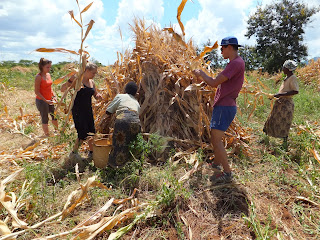Apparently, so I’m reliably informed, the UK has finally
experienced its first rays of sunshine this year. I’d like to take this
opportunity to also shed some light on just two of the projects that we’ve
recently engaged in, both of which epitomise sustainable development.
This week, we’ve all been busy in the fields, harvesting
maize. The stalks can grow upwards of 10 feet and take some effort to cut down,
pile together and then strip of the cobs. Nonetheless, it’s given us a great
insight into the success of ‘conservation agriculture’. This basically means
farming so as to make the most of all the natural resources that are available
and thus maximise crop yields. I won’t bore you with all the technicalities,
but suffice to say it uses simple methods (like mulching) to achieve stunning
results. The villagers we were helping had only just adopted it, yet enjoyed
vastly improved yields, some double or triple previous amounts. In a country
where 85% of the people live off what they grow (i.e. subsistence lifestyle),
this is a welcome step forward.
We’ve also been passing on skills and knowledge in the area
of sanitation. We’ve visited various rural communities and taught local workmen
how to construct ‘ecosan’ toilets. These toilets can be easily constructed with
readily available materials and tools, but dispose of the waste in a safe,
hygienic and environmentally friendly way. The workmen join us as, together, we
build a demonstration toilet; they can then use their training to build toilets
elsewhere. This equips the workmen with employable skills and simultaneously benefits
the wider community, such as by reducing diseases associated with poor
sanitation.
Both these schemes provide expertise whose lifespan and
benefits will be endure long after we have returned back home. There is no
ongoing investment required. To reiterate a common thread that has run through
many of these blog posts, the people have been empowered to help themselves.
